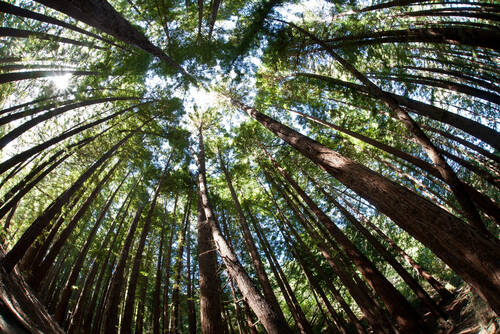Are we an “awe-deprived” society? Does such deprivation come at the cost of altruism? Psychologists studying awe voice their concern and describe their research in a recent article in the New York Times. Awe is defined as “that often-positive feeling of being in the presence of something vast that transcends our understanding of the world.” Awe spontaneously arises from collective rituals, celebrations, music, dance, natural beauty and religious worship. Acts of heroism and altruism also can move us to awe—even to the point of goose-bumps. Unfortunately, it’s disappearing from a culture that suffers from individualistic self-centeredness and reductive materialism.
In research using questionnaires, 1,500 subjects were asked to describe their experiences of awe. Next, the researchers set out to experimentally induce emotions of awe. They took subjects outside on the Berkeley campus to have them gaze for a short time at the spectacular 200 ft. high grove of Tasmanian blue gum eucalyptus trees. (Control subjects faced a nearby science building.) Further experiments involved watching five-minute videos of “sublime scenes of nature,” or writing reflections on their experiences of awe. (Control subjects were induced to feel emotions of humor or pride.)
The resulting findings gave evidence that emotional experiences of awe, wonder and beauty increased altruistic sharing behavior. In the questionnaire, those reporting more experiences of awe described a greater sense of altruism and were willing to give away the lottery tickets they had been awarded. More awe, more sharing. The individuals gazing at the famously beautiful tall trees were more willing to help another person after a staged “accident,” more so than those observing the building façade. Other groups of subjects who focused on their awe experiences also demonstrated more cooperation, sharing and sacrificial behaviors. If emotions of awe increase altruism and sharing, it is probable that evolutionary processes have selected these emotional responses as an aid to group survival.
The psychologists hypothesize that awe changes behavior because the felt emotion changes one’s sense of self. One is conscious of being part of something larger than the individual self. The self feels its membership in the collective and becomes smaller and more humble. Sharing behaviors toward others in the community will follow. Without such feelings and emotions altruism and communal feeling withers and individual self-interest dominates consciousness. “Awe-deprived” societies can suffer moral damage. (And can there be an “awe deprived” church believers might ask?)
As a psychologist I have questions about this research methodology, but as a Christian believer I welcome social scientific efforts to explore transcendent and positive feelings. I have found in my own religious life that feelings of awe, wonder and beauty do give birth to concrete unselfish acts. When your heart burns within you, a readiness to love, give and serve surges forth. Augustine’s cry stays with me: “O Beauty ever ancient, ever new, late have I loved you.” And now I can begin to affirm and better understand Dostoyevsky’s enigmatic words found in The Idiot. There the holy Prince Myshkin proclaims the prophetic truth, “The world will be saved by beauty.” If so, current cultural despisers of religious awe as morally irrelevant will have to think again.








